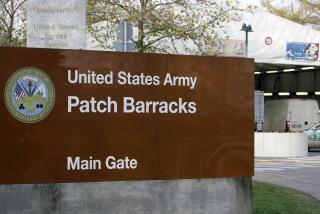2nd West German May Be Kidnap Victim in Beirut : Trial Is U.S. Priority Despite Risk to Hostages
- Share via
WASHINGTON — U.S. authorities, moving to extradite accused hijacker-murderer Mohammed Ali Hamadi from West Germany, have weighed the possibility of retaliation by Shia Muslim extremists, including the killing of Americans still held hostage in Lebanon, officials said Wednesday.
But the importance of bringing Hamadi to justice is considered paramount, they said. Atty. Gen. Edwin Meese III predicted that the suspect will be transferred to Washington for trial despite the kidnaping of a West German in Beirut last week and the apparent kidnaping of a second Wednesday, both acts believed to be in retaliation for Hamadi’s arrest.
The Pentagon announced that U.S. military installations around the world have stepped up security against possible terrorist attacks in response to West Germany’s capture of Hamadi, a Lebanese of Palestinian origin who is charged in the 1985 hijacking of a Trans World Airlines jetliner to Beirut and the killing of an American serviceman on board.
Alert Issued
Pentagon spokesman Robert B. Sims said an alert was sent to all installations and armed forces personnel worldwide urging “increased prudence in case they (terrorists) try something.”
Meese told reporters after addressing an international conference on terrorism here that he could not speculate on whether the status of the two West German citizens in Lebanon might delay the extradition of Hamadi.
But Associate Atty. Gen. Stephen S. Trott said that the extradition process would probably take “a matter of weeks.” Asked if extradition would still be pressed if the lives of the West Germans were threatened, Trott replied that “we’re not going to allow blackmail to steal justice from us.”
Referring to Hamadi, Trott said American citizens “are entitled to see him stand before the bar of justice to answer the evidence that we intend to present against him.”
W. German Threatened
His remarks came after a representative of the Palestine Liberation Organization said in Bonn that one of the missing West Germans, Rudolf Cordes, who was seized by terrorists in Beirut on Saturday, will be killed if West Germany hands over Hamadi to the United States.
That threat, along with the possible slaying of the five U.S. hostages held by extremist groups in Lebanon, was among the “horribles” that officials considered before seeking to push hard for extradition, one source said.
To relent in the face of retaliation by Hamadi’s allies would be to assure that “more and more hostages would be taken,” one official said.
The United States agreed not to seek the death penalty for Hamadi because West Germany does not recognize capital punishment and bars extraditing a prisoner for a capital crime.
The charges against Hamadi, 22, who was arrested last week in Frankfurt, stem from the 16-day ordeal of 39 American passengers and crew members aboard TWA Flight 847, including the beating and murder of Navy diver Robert Dean Stethem, 23.
The hijackers are believed to be members of Hezbollah (Party of God), a radical Shia Muslim organization with ties to Iran. Besides Hamadi, three other Shias have been indicted by a Washington grand jury in connection with the incident. They are still at large.
After the kidnaping of Cordes in Beirut last Saturday, a second West German national, Alfred Schmidt, was reportedly missing and apparently kidnaped late Tuesday near the Summerland Hotel there.
But Meese told the conference on terrorism that “we have a moral obligation to other potential hostages not to capitulate to hostage-takers because to do so would only encourage more incidents and many more threats to human life.”
Asked if he thought bringing Hamadi to this country might spur terrorist attacks in the United States, he said that whenever someone is put on trial “there is always that possibility.” But the government will take “the necessary steps” to counter such a threat, he said.
Defense Secretary Caspar W. Weinberger, who also addressed the terrorism conference, did not mention the special alert for U.S. military forces worldwide, but he said the Pentagon is “in the process of reorganizing our special operations forces” to prepare for quick military strikes against terrorists.
More to Read
Sign up for Essential California
The most important California stories and recommendations in your inbox every morning.
You may occasionally receive promotional content from the Los Angeles Times.












